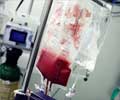The country’s premier medical institute, AIIMS was the scene of a horrible mix-up recently. Medics transfused blood from the wrong blood group into a middle-aged man, who is now battling for life.
The patient, 50-year-old RN Tripathi, underwent a knee replacement surgery on October 17. During this he was given O+ blood instead of B+. Following this, he suffered an acute renal failure. Tripathi has already had at least seven dialysis sessions. He remains in bed number 4 of the CT2 ICU ward; a cardiology intensive care unit of the institute.The patient was admitted under the care of Dr Rajesh Malhotra, professor in the department of orthopaedics, AIIMS. Though Malhotra admits having done the surgery, he vouches that the patient showed no signs of kidney trouble in the pre-operation tests. "What has happened to him after that is a transfusion reaction but I cannot comment on whose fault it is. In fact, for a knee replacement, blood is not even transfused during the operation; it is done after that. His treatment is on. You may get an official reaction from Dr Shakti Gupta."
Meanwhile, AIIMS spokesman, Dr Shakti Gupta was reported that it was not possible to get patient details at such "short notice".
The main danger of a blood transfusion is that the wrong blood type may be accidentally given. This occurs once in every 14,000 transfusions.
Transfusion with the wrong blood type can result in a severe, sometimes life-threatening reaction, termed ‘Hemolytic transfusion reaction’. Here the mismatched transfused red cells react with the patient's own anti-A or anti-B antibodies.
This reaction can destroy red cells in the circulation, initiate acute renal failure and cause intra-vascular coagulation. Infusion of ABO-incompatible blood is mostly due to errors in taking or labeling the sample, mixing up beds, collecting the wrong blood from the refrigerator or inadequate checking when the transfusion of the pack is being started.
Advertisement
Source-Medindia
ANN/M









